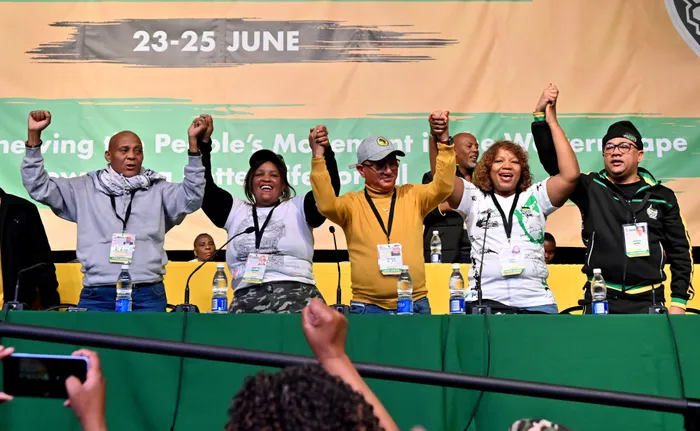New Western Cape ANC leadership brings glimmer of hope

Picture: Ayanda Ndamane/African News Agency (ANA)/Taken on June 25, 2023 – New ANC Western Cape chairperson Vuyiso JJ Tyhalisisu, deputy chairperson Sharon Davids, secretary Neville Delport, deputy secretary Ayanda Bans and treasurer Derek Appel, were elected during the Provincial Conference at the CTICC in Cape Town.
By Bheki Mngomezulu
In recent years, the ANC has been limping on many fronts. Not only did the party see its support dwindling nationally, it also experienced the disappearance of its leagues. The ANC Women’s League (ANCWL), ANC Youth League (ANCYL) and the MK Veterans League have all been operating on interim structures.
These developments have weakened the ANC significantly. Both in the 2017 and 2022 general elections of the party, the leagues were not well represented. This was unprecedented in the ANC and raised questions about the party’s political future.
In the Western Cape, the ANC has been operating on an interim structure, which was led by Lerumo Kalaka. The absence of a proper provincial structure of the ANC has happened at a time when the DA is determined to consolidate its grip on power in that province. This has rendered the ANC incapable of challenging the DA with the hope to eventually unseat it.
The party (ANC) has itself to blame. The Western Cape was under the ANC with Ibrahim Rasool as its chairperson and Mcebisi Skwatsha as the party’s provincial secretary. It was the schism between the two leaders that handed the Western Cape on a silver platter to the DA. Since then, the party has struggled to regroup so that it could be a force to be reckoned with. This has allowed the DA to dominate the politics of the Western Cape – winning every successive election with a convincing margin.
The recent election of the ANC’s new provincial leadership brings a glimmer of hope that the party might be on its way to recovery. However, this journey will not be easy. The DA has already entrenched itself in the province and will not relinquish power easily.
As is the case at national level, the Western Cape is not immune to factional politics. In fact, besides the well-known factions, the Western Cape created its own faction before this election. The likes of Lerumo Kalako and Neville Delport associated themselves with a group which they called “Rurals for change”. By so doing, they created the ‘us and them’ binary – a nemesis to unity.
Another important point is that this election had many surprises. Firstly, the initial expectation was that Qubudile Dyantyi was going to contest the position of chairperson against Cameron Dugmore who is the former MEC for Education and has been leading the opposition party in the Western Cape Legislature.
Surprisingly, Dyantyi failed to meet the required threshold and thus could not make it to the ballot. The same applied to Anwa Dramat who was with the Hawks.
Vuyiso JJ Tyhalisisu, former Dullah Omar regional secretary was nominated from the floor and eventually emerged victorious against Dugmore – pocketing 311 votes against Dugmore’s 282. The 29-votes difference meant that the margin was narrow. However, it did not change the fact that Tyhalisisu became the “dark horse” in this leadership race.
These developments mean that Tyhalisisu has his work cut out. Firstly, he must win the support of those who did not see him as the preferred candidate at first. Secondly, he must unite his leadership structure and appeal to all members to bury their differences. Thirdly, he must instil confidence in the new leadership structure so that it could be confident to take the DA head-on. Fourth, he must dissuade this new leadership structure from factional politics in the ANC at the national level. Fifth, and most important, he must convince the electorate in the Western Cape as to why the ANC deserves to be given a chance against the DA.
With a quick look, the new leadership structure has the potential to pull things through. It is diverse in many respects. This includes variables such as gender, race, and age. But these advantages alone cannot save the day. What is needed most is both individual and collective political maturity. Placing the interests of the party before those of the individuals would be a step in the right direction.
The Western Cape ANC’s leadership election preceded other elections scheduled to take place in June and July 2023. After a lull which spanned several years, the ANC Youth League scheduled its elective conference for June 30 to July 4. This was refreshing.
On their part, both the ANCWL and the Veterans League also planned their elections to take place in July. Such developments mean that at long last, the ANC could go back to “normal”.
While these developments bring a glimmer of hope, they should not be misconstrued to mean that the ANC will miraculously rise from the ashes. In the Western Cape, the party needs to double its efforts. Nationally, the ANC needs to win back the trust of its own members and that of the general electorate too.
Professor Bheki Mngomezulu is the director of the Centre for the Advancement of Non-Racialism and Democracy, CANRAD, at Nelson Mandela University
This article is original to The African. To republish, see terms and conditions.